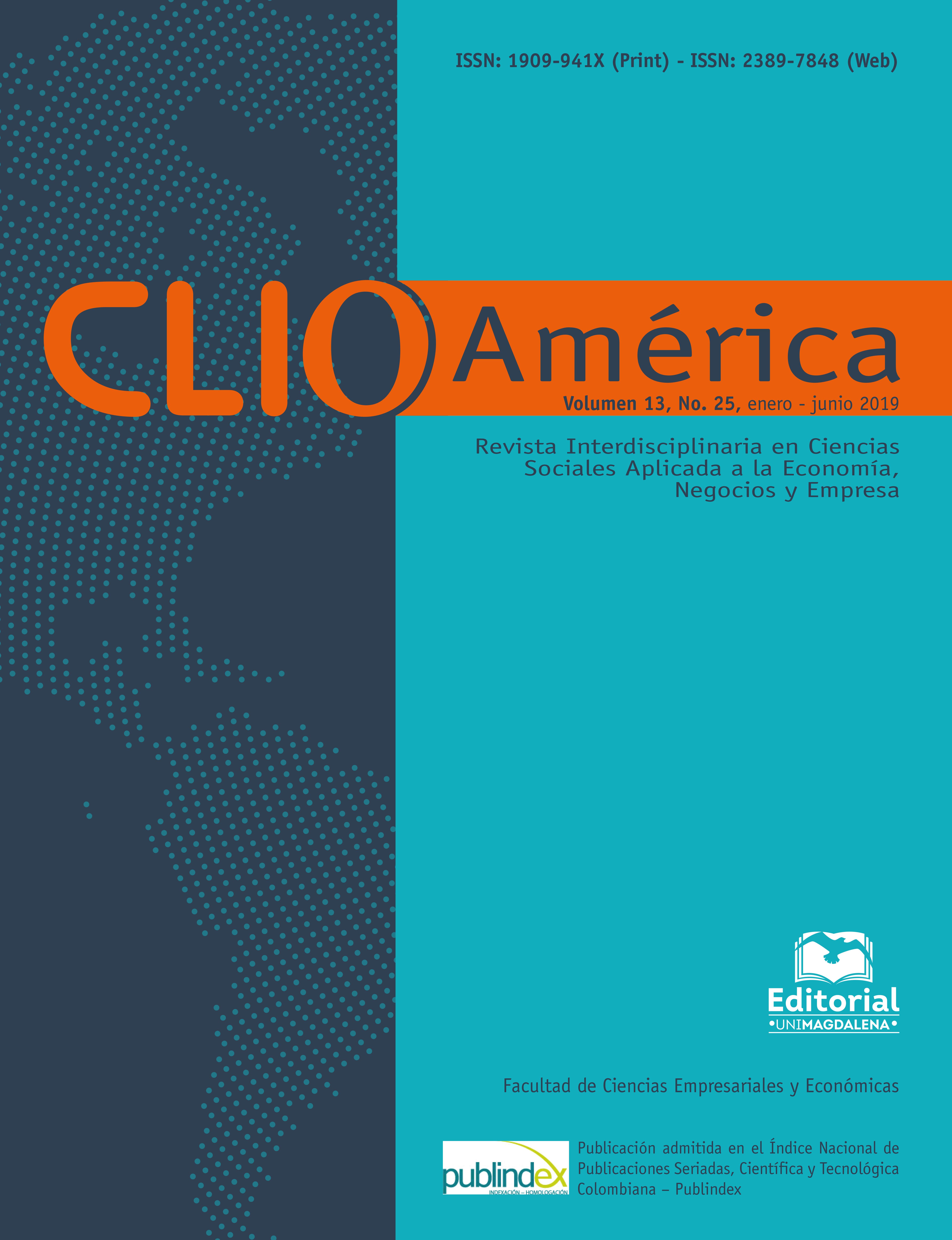Tourism development from city-port concept, for the Barranquilla city, Colombia
Main Article Content
Abstract
Downloads
Article Details

This work is licensed under a Creative Commons Attribution-NonCommercial-ShareAlike 4.0 International License.
This journal provides an open access to its content, based on the principle of offering the public free access to research, helping to increase global knowledge exchange. Likewise, the printed version is freely accessible and has no associated costs per publication.
References
Acto Legislativo 01 (1993). Por medio del cual se elige a la ciudad de Barranquilla, Capital del Departamento del Atlántico, en Distrito Especial, Industrial y Portuario,40995, 1993,18, agosto.
Asociación Internacional de Villes et ports. AIVP. (2016). La red mundial de ciudades puertos. Recuperado dehttp://www.aivp.org/es/miembros-y-objetivos
Bruttomesso, R. (2004). Complejidad en la relación puerto-ciudad. Ingeniería y Territorio(67), 22-31.
Bruttomesso, R. (2011). La ciudad portuaria del siglo XXI. Nuevos desafíos en la relación puerto ciudad.Venecia: RETE
Bruttomesso, R. (2014).Transformación del concepto ciudad puerto. II Congreso Internacional Portuario, Marítimo y Fluvial. Universidad Autónoma del Caribe. Barranquilla, Colombia.
Clark, G., Huxley, J. y Mountford, D. (2010), Organising Local Economic Development: The Role of Development Agencies and Companies. Paris, Francia: OCDE. doi: https://doi.org/10.1787/19901097.
Constante,Y. (2011). Identificación, caracterización y valoración del patrimonio arquitectónico industrial de Barranquilla (tesis maestría).Pontificia Universidad Javeriana. Bogotá.
Consuegra,B. I. (2008). Estación Montoya. El edificio de las nostalgias. Barranquilla, Colombia: Universidad Simón Bolivar.
Departamento Administrativo Nacional de Estadística-DANE. (2008). Censo general 2005.Recuperado de: https://www.dane.gov.co/files/censos/libroCenso2005nacional.pdf
Díaz-Solano, B.H. (2015). Perspectivas y prospectivas del desarrollo turístico de la zona costera del departamento del Atlántico. Barranquilla, Colombia: Uniautónoma.
Domínguez, L. J. (18 de enero de 2006). Contenedores y turistas:reflexiones sobre la relaciòn ciudad y puerto a inicios del siglo XXI. Revista geografía, espacio y sociedad, 1(1), 1-13.
Ducruet, C. y Lee. S.W. (2006). Frontline soldiers of globalisation: port-city evolution and regional competition. GeoJournal, Springer Verlag, 67(2), pp.107-122.
Foulquier, E. (2001). L’Uruguay et son insertion régionale. Le rôle des ports dans la structuration des territoires(tesis doctoral). Université de Nantes, Francia.
Foulquier, E. (2011). L’intensité conflictuelle. Communautés portuaires-GECOPE. Recuperado de http://gecope.hypotheses.org/41
Gobernación del Atlántico. (2012). Plan de desarrollo 2012-2015. Recuperado de http://www.atlantico.gov.co/images/stories/plan_desarrollo/plan_desarrollo_2012-2015.pdf
Goenaga, M. (1953). Lecturas locales. Crónicas de la vieja Barranquilla. Barranquilla, Colombia: Imprenta Departamental.
Grindlay, A. (2008). Ciudades y Puertos. Ciudad e Infraestructuras,(11),53-80.
Guigueno, V. (2002). Le rivage des ingénieurs. Le Mouvement Social, (200), 147-152.
Hall, P. y Hall, P. H.(1991). Waterfronts: a new urban frontier. Berkeley, CA, Estados Unidos: Institute of Urban and Regional Development, University of California.
Marnot, B. (2011). Les grands ports de commerce français et la mondialisation au XIXe siècle.Parìs, Francia: PUPS.
Márquez, J. W. (2011). Modernización sobre Rieles. El Ferrocarril de Barranquilla y el Tranvía Eléctrico de Medellín. Dos Obras de Gran Impacto en el Proceso de Construcción de Ciudad: 1870-1955. Memorias, (15), 126-169.
Murphey, R. (1989). On the evolution of the port.En F. Broeze(Ed.),Brides of the Sea: Port cities of Asia from the 16th to 20th centuries(pp. 223-245). Honolulu: University of Hawaii Press.
Ospina, J. C. (2014).Contrastes de nuestra realidad y proyección de Ciudad Puerto: Caso Barranquilla. II Congreso Internacional Portuario, Marítimo y Fluvial. Universidad Autónoma del Caribe. Barranquilla, Colombia.
Ospina, J. C. (2015). Gestión del sistema de control de tráfico marítimo en Colombia. Barranquilla, Colombia: Educosta.
Port Finance International Ltd. (2014). Maasvlakte 2 inaugurated after costing €150M less than expected. Recuperado de http://portfinanceinternational.com/categories/finance-deals/item/872-maasvlakte-2-inaugurated-after-costing-%E2%82%AC150m-less-than-expected
Posada, C. E. (1987). Una invitación a la historia de Barranquilla. Bogotá, Colombia: Cerec-Cámara de comercio de Barranquilla.
Priemus, H. y Van-Wee, B. (2013). International handbook on mega-projects. UK: Edward Elgar Publishing Limited.
Quintanilla, A. y Iracheta, A. (2008). Ciudad, puerto y turismo: estrategias para una integración sustentable. Memorias del IX Seminario-Taller Internacional de la red mexicana de las ciudades hacia la sustentabilidad. Colima, México: Universidad de Colima.
Sánchez, B. (2003). El futuro de las relaciones puerto ciudad. Recuperado de http://www.udc.es/iuem/documentos/monografias/puertoCiudad.pdf
Sobrino, J. M. (2013). La politique maritime intègrèe del l`union europèenne.Paix et securitè internacionales, (1), 13-32. Recuperadode: https://dialnet.unirioja.es/descarga/articulo/4579863.pdf
Song, D. W. y Photis, M. P. (2015). Maritime logistics. A guide to contemporary shipping and port management (2 ed.). Croydon, UK: CPI Group.
Vergara, R. A. y Foulquier, E. (2012). Maritimidad en Barranquilla etapas del desarrollo urbano y su relación con el puerto. Invetigaciòn y Desarrollo, 20(1), 4-31.

